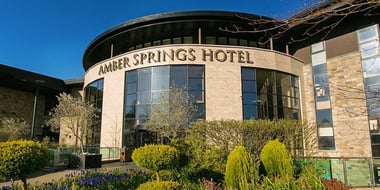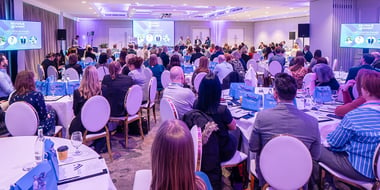The booking button on your hotel website is the goal – it’s not the strategy. To persuade guests to book, you need a hotel marketing strategy to drive qualified traffic to your site and, once they’re there, convince them you’re the best! You need pages that are solely focused on driving direct bookings. These are known as landing pages, and they are highly effective.
For example, Dell increased their conversion rate by 300% with landing pages. Your hotel can win with landing pages by using them to promote your special offers, weddings or other specific events.
[yop_poll id=”1″]
If you’re on the fence about investing in landing pages, we’re here to tell you why they’re so important. Here are the top 4 reasons landing pages are right for your hotel marketing strategy:
1. Landing Pages Focus On One Thing:
There are a lot of distractions are present on the average hotel website’s home page, even the best-designed ones.
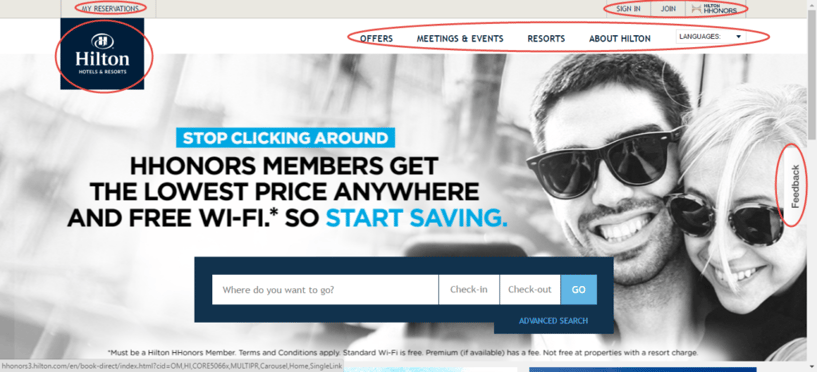
Image source: Hilton Hotels
Even Hilton’s homepage has a booking form, the navigation menu with different types of rooms, offers, restaurants and other services like spa and gym. On the home page there are also distractions like email signup forms, links to the different parts of your website, and various special offers.
We’ve seen hotels with 3 or 4 different scrolling banners on their homepage, plus popups and other animations – that’s a distracting mess worthy of the late 90s.
Now, signup forms, links, and navigation menus aren’t bad. They each have a role to play, and they help guests through various stages – dreaming, researching, looking and figuring out what they want. Landing pages, however, are focused on a single goal, like getting signups to your loyalty programme or getting bookings for one special offer.
When it’s time to book, your homepage features become conversion killers. We usually assume that more options = more choices = high conversions. However, having too many options can actually causes chaos and unhappiness .
It makes it harder for potential hotel guests to make a decision.
If you’ve got doubts, check out Schwartz’s Paradox of Choice – one of modern psychology’s most important theories:
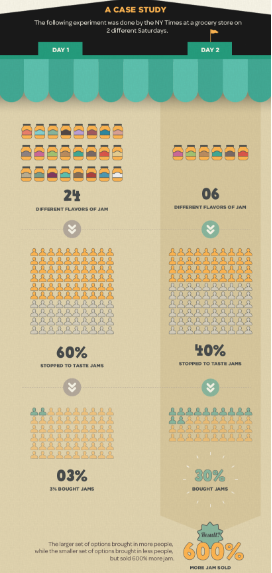
Schwartz’s famous experiment on choice
Presented with too many options, people might plan on thinking deeply about it and making a decision later. Once a visitor is off your site, however, they might come across another hotel they like while they do this. An immediate decision is always better.
Landing pages are designed to drive immediate decisions. Landing pages have minimal menus, and no links to other pages or websites. The design and copy on these pages focus on one product or service, and their aim is to get people to convert. Instead of wasting time pondering, people are encouraged to book rooms immediately.
Landing pages should exist for:
- Your special offers
- Competitions
- Signing up guests to your newsletter
- Specific, granular products like weddings or spa packages
- Upsells and cross-sells
2. Landing Pages offer Better Targeting:
Bad marketers create marketing material that targets everyone. They want to cast a wider net and hope to catch as many as hotel guests as possible.
Savvy hotel marketers understand the importance of specificity, and know that being more precise lets them reach more real prospects while staying on budget. The more specific they are, the higher their conversion rate will be.
[yop_poll id=”2″]
The copy, design, images and every other subject on your hotel’s website should be catered towards getting your target audience to convert.
However, what if you’re too precise? For example, after your website is up and running for a while, you might look into your analytics and find that 50% of the people visiting your website are family travellers looking for a nice homely place – exactly who you’ve been targeting.
The other 50%, however, are a mixture of business travellers, young travellers and others. It’s still a no-brainer to have a website that focuses on converting the family travellers – after all, they’re half your traffic!
Your bottom line is still suffering, though. 50% of the traffic you are getting will go to waste. You need a solution to convert these people to too. We’ve got a solution: landing pages.
By using landing pages, you can create several versions of the same page. The copy and design for each of these pages can focus on converting different segments of your audience. You can then direct relevant traffic to each of these pages with the help of targeted digital marketing campaigns.
Reference your different customer personas for all your different target audiences, and write copy exposing an angle they’ll find more desirable.
You can also create landing pages that focus on generating leads, as they will be distraction-free. How many should you have?
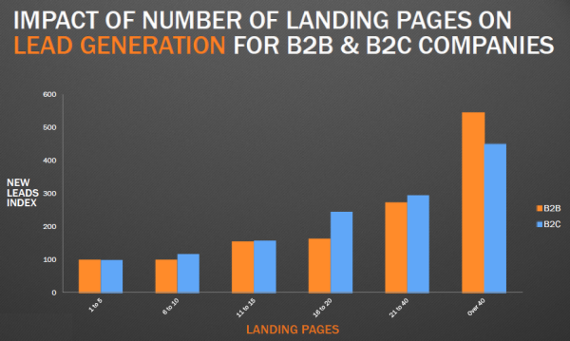
A study by Hubspot found that companies see a 55% increase in leads when they increase the number of landing pages from 10 to 15. It went even higher once businesses had 40 or more landing pages.
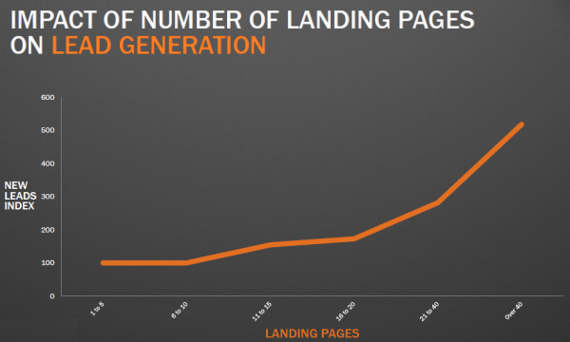
Your landing page needs will differ based on the size of your hotel, your target audiences, the number of offers and services you have, and other factors. Don’t be afraid of making too many!
3. Landing Pages Help Create Funnels:
An essential step to a marketing strategy in any business, including hotels, is to use tried-and-tested marketing funnels.
The top online marketing funnels have one thing in common: landing pages. If you create all the basic landing pages you can set up any funnel with ease. The basic landing pages should do everything from helping you generate leads to getting people to book your rooms and then purchase more services.
Here are 4 basic landing pages you can create…
- Lead generation landing page: Good funnels start with free, interesting content where people sign up with their email address in exchange for the content. This content helps you build a relationship with your audience, and getting their email address makes it easy for you to send them information about products and offers. Create a lead generation landing page that convinces people to give you their email address. You could offer a discount code, exclusive access to offers, or a guide to something in your hotel’s local area.
- Redirection landing page: Immediately after people sign up to your funnel, you should redirect them to another landing page which entices them to buy a room. This page will help you differentiate buyers from those that are only interested in your newsletter right now. If they don’t book straight away, it’s okay – you have their email address! You can promote your hotel rooms and other services to these buyers later.
- Room landing pages: Try creating landing pages for the different types of rooms you offer. Buyers can be sent to these pages based on their email behaviour. You can also run remarketing ads – if someone has spent time on your executive suites room page, you can remarket to them with ads that will take them to a landing page for your executive suites.
- Upsell and cross-sell landing pages: After your guests make a booking, consistent follow up with upsells and cross-sells before their stay is always a good idea. They help maximise profits, and over time their purchases show you what your guests are really interested in. These could be things like asking people to upgrade their rooms, book a table at a restaurant, get a gym pass and so on.
Once you have those landing pages set up, you’ll be able to run very targeted campaigns for special offers, and remarket to guests interested in specific products. After you set them up, it won’t take you much time to run it: everything will be fully automated. A tool that makes it easy to set up landing pages and organise them into funnels is Click Funnels.
4. Landing Pages are Easy to Test:
Following best practices when you build your landing pages will help ensure they convert really well, but nothing is perfect. To optimise your pages, you need to test them.
The traditional way to do this is through split tests or A/B tests. This is when you create 2 or more versions of your website and then direct an equal amount of traffic to all these versions to see which one converts best.
However, most hoteliers don’t have high enough traffic to do split tests – it’s simply the nature of the game. So, instead, test with tools like the 5 second test, ask staff members, and ask friends. You can also run split tests, of course – but keep in mind that it might take a while to get statistically significant results, depending on your traffic.
Some elements that are regularly tested by marketers are…
Call to action buttons: The call to action button plays a key role in converting visitors to hotel guests. You can test things like colours, wording, symbols and positioning.
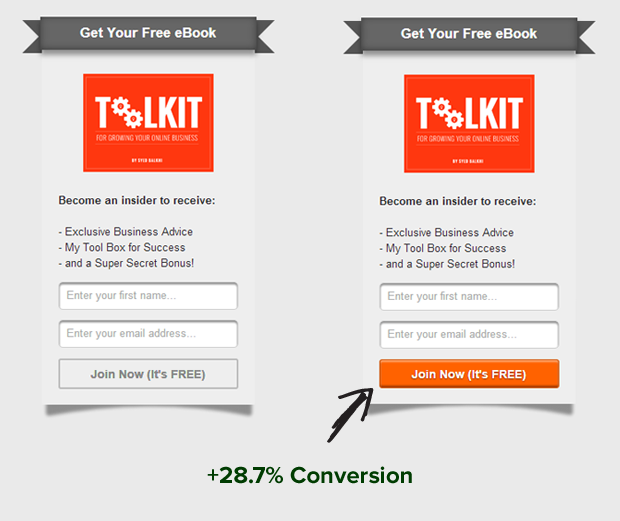
The above image is an example of a good split test on call to action buttons. After changing the button colour to orange, their conversion rate increased by 28.7%.
Copy length: Does your landing page have a few big paragraphs of text, or just a few bullet points? Test long- and short-form versions of your copy to see which is more compelling for your visitors.
Headlines: Headlines make a difference between whether someone reads the rest of the landing page or not. They’re one of the most important elements you can test. When you’re writing them, focus on clarity over gimmicks – but make them interesting!
Social proof: You can also add award badges and reviews from past guests to see if it improves conversions. Social proof is one of the strongest ways to build trust, especially when you’re selling something as big as a hotel room.
Test as many aspects of your landing page as you can until you find the one that gets you the best results. Then, use that data to improve the rest of your site too. Here are 71 testing ideas for you to try.
Conclusion
To summarize, landing pages are important for their emphasis on conversion, better targeting, their role in creating funnels and the ease with which you can test them are the main reasons why you should use landing pages.
All these benefits together help your hotels sell more rooms and services and earn more. Landing pages are relatively cheap to set up, easy to maintain, and they drive direct bookings.
Are there any other reasons why landing pages are right for a hotel marketing strategy? What benefits have you gained from implementing landing pages?

